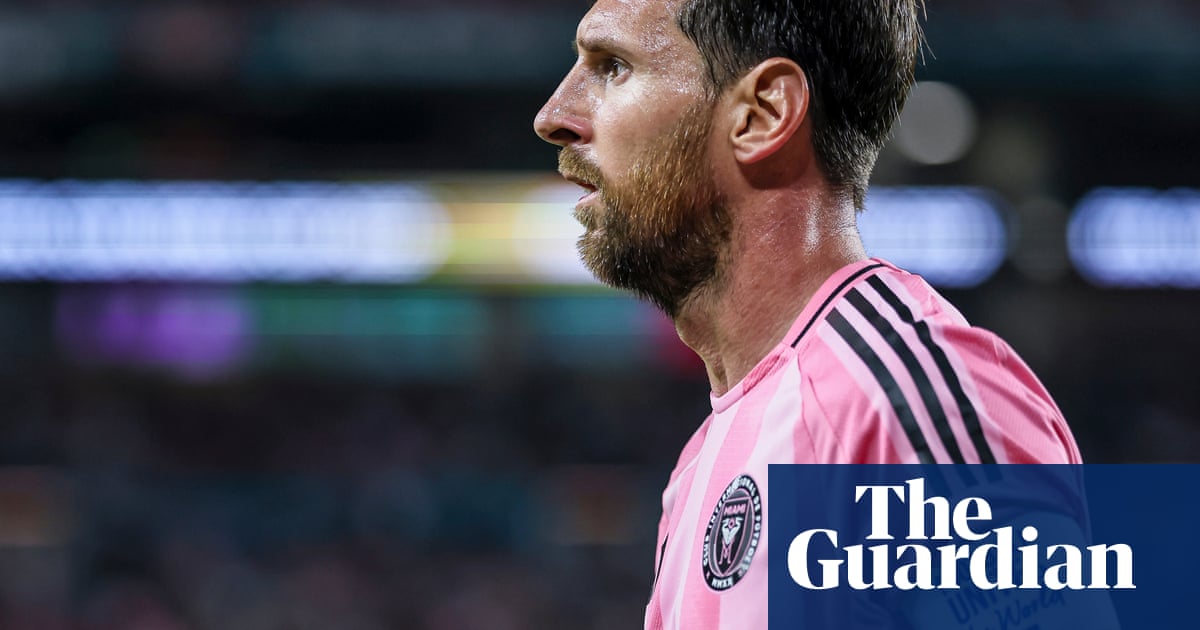Well, this was at least a first. Gianni was right on that front. On a clammy, boisterous, vaguely hallucinogenic night at the Hard Rock Stadium, the opening act of Fifa’s billion dollar death star, the newly bulked and tannedClub World Cup, did produce something genuinely new. This was surely the first major sporting event where the opening ceremony was infinitely more entertaining, and indeed comprehensible as a basic human activity, than the sporting spectacle that followed.
By the end the best team in Africa, Al Ahly, had drawn 0-0 with a largely incoherentInter Miami, a team that looked in the first half like people who had a dim idea what this sport is meant to look like, but who were also struggling through a terrible wall-eyed hangover to remember which way is forward.
The second half was better, mainly because some element of theLionel Messiidentity began to assert itself, a muscle memory of genius, like watching the aged Frank Sinatra still tootling out That’s Life on stage in Vegas, still drawing huge gales of applause for basically nodding a lot and pointing at the crowd.
This was the only significant emotion here: a deep sadness at seeing this spectacle play out, the post Messi-Messi, wheeled on to this stage of fakery, an instrument of sporting beauty weaponised in his dotage to promote a power grab.
And watching this you really got the scale of Fifa’s act of deception, its betrayal of sport, the cynicism of its methods. Because everybody loves Messi, because there is a hard-wired emotional response, because you basically cannot resist. We will bolt the aged Messi to the front of our project, will play with your feelings, will in effect produce a kind of targeted sporting crystal meth.
Actually that sounds a bit too exciting. The football here was largely abysmal. Does this matter? This thing isn’t really built to be a robust sporting entity. It is simply product, an attempt to capture a global market. This is Fifa enabling the foreign policy aims of Saudi Arabia, sticking a flag in the middle of the world’s greatest popular culture megaphone. It’s the projection of a single essentially random Swiss administrator.
Although, to be fair, lots of things that were supposed to be bad were actually fine here. The talk of half-empty stadiums always seemed a bit over the top. The Fifa marketing machine is a juggernaut. Americans are good at turning up to stuff. And mainly it was never going to be empty because Messi was here, Miami loves Messi, and America loves stars.
The Hard Rock is a castle-on-the-hill kind of structure, with its crisp white flying roof, dumped down in a vast expanse of shimmering tarmac. By the time the opening ceremonials came around the stands were pretty much full. The great Sir David appeared, looking graver now, hands folded like the fourth earl of Sandwich, producing one of those expensive-looking regal waves, not really a wave at all, just a power-flex.
A DJ played club tunes, which was fun and infectious and gleefully received, not because of Fifa or football but because this is Miami and something about the air, the heat, the light just makes this a place of fun and pleasure and show, and because Miami is basically full of beautiful glowing people who look like they’re probably eternal.
The ceremony was genuinely good, not the stiff, mannered stuff these affairs often dish up, but loads of people dancing and playing horns and looking like they actually enjoy doing this. A terrifying horror movie-style voice shouted “take it to the worrrlllldd”, in a manner that suggested its owner was in the process of being expertly throttled.
Messi was last out on to the pitch. Everyone went predictably nuts, a shared static field of excitement, event glamour, the sense of being present at some kind of celebrity miracle.
He started in a non-position, just walking about vaguely, like a man having a stroll while listening to a podcast. Messi does, though, still have the shuffle the little switch, the groove, the music in his head. Watching him you got that feeling of a truly great footballer who can still see it all, but just can’t call the shapes into being, Mozart with tinnitus, Hemingway staggering about the Florida Keys in his soggy late days, still feeling his own greatness, still the matador, even while he’s sinking pisco sours in a crab shack
There was something frustrating, and even slightly offensive about seeing Messi like this. It expresses perfectly the deeply manipulative nature of this event, of owners and political interests who will take that thing you love and use it to move the world around, who know you simply cannot resist. That thing that gives you pleasure and feels like freedom and joy? We will inject it into your eyes like a forced stimulant, a kind of footballing pornography.
Al Ahly should have scored at least twice in the opening 20 minutes. They missed a penalty. The YouTube overlord IShowSpeed appeared in the half-time break and prodded a ball toward the goal a few times trailed by a man with a camera coiled into a furious crouch, as though preserving the last recorded sighting of the snow leopard.
Messi woke up in the second half. Miami were better. They might have won, or at least scored. But a goalless draw felt right. The people in the stadium were the only winners here, in a city that just loves its nights.
Otherwise Saturday in America was a day for a divisive, autocratic president to stage his own hugely overblown and narcissistic Grand Parade. It was in the end a pathetic spectacle, and in every sense of the word, the ghost of something great and pure and much-loved, out there being sold back to you like an empty replica shirt.
